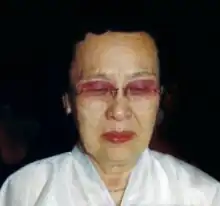Ryo Won-gu
Ryo Won-gu (November 1928 – July 2009; Korean: 려원구) was a North Korean politician. She is best known for her work on inter-Korean diplomacy during her time as chair of the Democratic Front for the Reunification of Korea and vice chair of the Supreme People's Assembly.

Early life and education
Ryo Won-gu was born in 1928 in Seoul.[1][2][3] She was the third daughter of the politician Lyuh Woon-hyung, a Korean reunification activist and politician who was assassinated in 1947.[1][2] Before her father's assassination, in July 1946, Ryo Won-gu and her older sister Ryo Yon-gu had defected to North Korea and moved to Pyongyang.[2][4][5]
Then, from 1946 to 1954, Ryo lived in Moscow, where she was a student at Moscow State University.[1][2][6]
Career
For a period beginning in 1989, Ryo taught at Pyongyang's Kim Chaek University of Technology.[1][2][5] Then, beginning in 1991, she served as vice chairman of North Korea's Education Committee, an equivalent to the deputy secretary of education or vice education minister in some other countries.[1][5]
From 1998 to 2009, Ryo served as a vice chairperson of the 10th and 11th Supreme People's Assemblies.[2][7][8] Also beginning in 1998, she became co-chairwoman of the Democratic Front for the Reunification of Korea.[1][2] She also served as a delegate to the Presidium of the Supreme People's Assembly.[1] In her work, she often followed in her sister Ryo Yong-gu's footsteps, succeeding her in her roles in both the Supreme People Assembly and the Democratic Front for the Reunification of Korea after Ryo Yong-gu's death in 1996.[2]
Ryo Won-gu was heavily involved in diplomatic efforts between North and South Korea, especially after her sister's death, and was considered an expert on the subject of South Korean relations.[2][6][9] In 2000, she helped host South Korean President Kim Dae-jung during that year's inter-Korean summit.[6] Then, in 2002, she drew notice by visiting Seoul on Liberation Day, paying a visit to her father's grave in the city during her trip.[1][2]
In 2005, Ryo was awarded the National Reunification Prize by the Presidium of the Supreme People's Assembly.[10] In 2007, she was named a recipient of the Order of Kim Il-sung, North Korea's highest order.[11] She died in 2009 at the age of 81.[1][12]
References
- Kim, Sue-young (2009-08-02). "Yo Won-gu Dies at 81". The Korea Times. Retrieved 2022-01-27.
- Hoare, James E. "Ryeo Won-gu". Modern Korean History Portal. Retrieved 2022-01-27.
- Hong, Jin-soo (2009-08-01). '몽양' 셋째딸 北 려원구 사망. Kyunghyang Shinmun (in Korean). Retrieved 2022-01-27.
- Hoare, James E. (2019-09-04). Historical Dictionary of Democratic People's Republic of Korea. Rowman & Littlefield. ISBN 978-1-5381-1974-7.
- Yonhap News Agency (2003). North Korea Handbook. M.E. Sharpe. ISBN 978-0-7656-3523-5.
- "Ryo Won-gu". KBS WORLD Radio. Retrieved 2022-01-27.
- "SPA Chairman and vice-chairmen elected". KCNA. 1998-09-05. Archived from the original on 2015-04-02.
- "1st Session of 11th SPA of DPRK Held". KCNA. 2003-09-03. Archived from the original on 2007-05-16.
- Ko, Soo-suk; Baik, Sung-ho (2003-01-06). "Hand-holding, tears a link for North, South". Korea Joongang Daily. Retrieved 2022-01-27.
- "National Reunification Prize Awarded to Persons of Service for National Reunification". KCNA. 2005-06-14. Archived from the original on 2014-10-12.
- "North Korea awards prizes to mark late leader's anniversary". BBC Monitoring Asia Pacific. 2007-04-15.
- "North Korean leader mourns assembly member's death". KCNA. 2009-07-31.